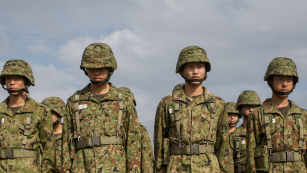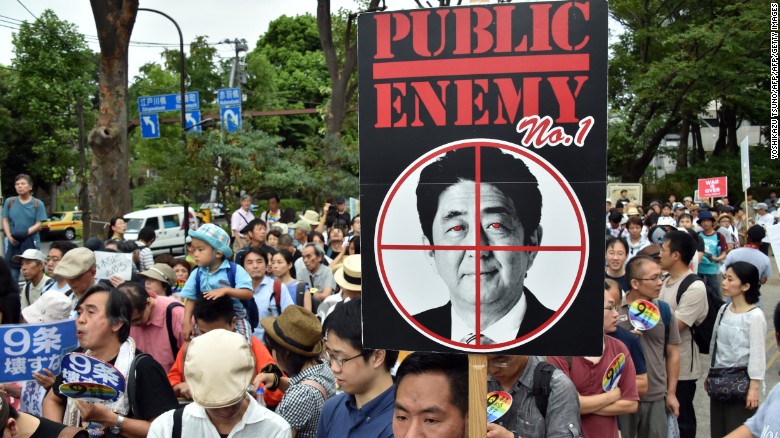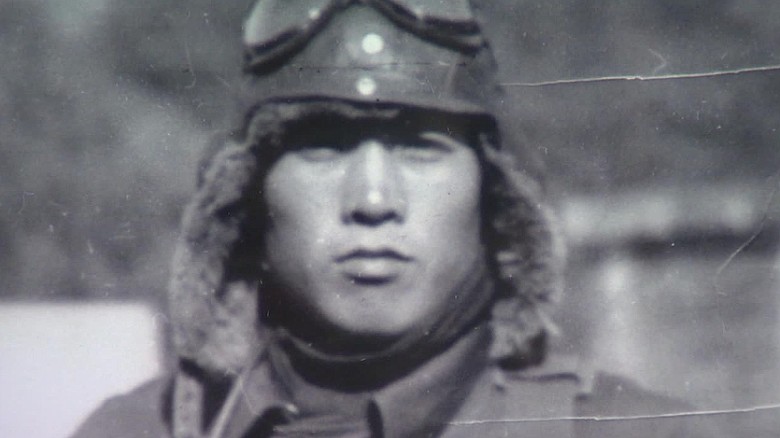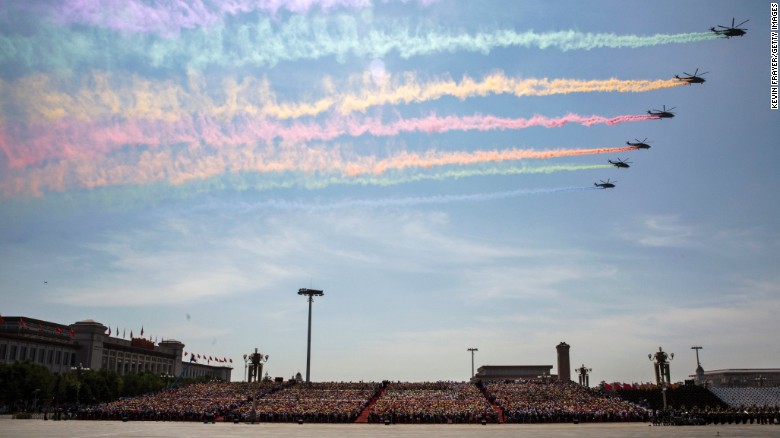Assertive Japan poised to abandon 70 years of pacifism
Japan's upper house of Parliament is poised to pass the first major reinterpretation of the country's pacifist constitution since the end of World War II, despite fierce and vocal opposition that culminated with lawmakers getting into physical altercations.
The historic vote, which could take place Friday, marks the most dramatic shift in Japanese military policy in 70 years, and has triggered the largest protests seen in Tokyo in decades.
A scuffle broke out Thursday as opposition lawmakers in a special committee of the Upper House attempted to delay a vote. But the bill ultimately passed the committee, clearing a key hurdle and setting the stage for a vote on the measure.

Why is Japan expanding its military?
The controversial legislation reinterprets Article 9 of the Japanese constitution, which outlaws war as a means of settling international disputes.
The reinterpretation allows Japan to exercise collective self-defense, enabling the Japanese military, known as the Self-Defense Forces (SDF), to fight overseas and defend allies with limited conditions.
The argument for the bills
Supporters of the legislation, including top U.S. officials, say Japan needs to expand the role of the SDF to counter potential threats from nations such as China and North Korea. Both continue to develop their military and nuclear weapons programs.
Earlier this month, China staged its largest military parade ever to celebrate 70 years since Japan's World War II defeat. Beijing remains locked in territorial disputes with multiple Asian neighbors in the East and South China seas.
On Tuesday, North Korea warned the United States and its allies that it is ready to use nuclear weapons "at any time" and is expected to launch a new satellite using a long-range rocket sometime in the coming weeks.
Tokyo has faced growing international pressure to expand the role of its military todefend the interests of its key allies, including the United States. America is bound by treaty to defend Japan, an agreement that has been in place since 1960.
"Japan is like the 42-year-old kid still living in the basement of the United States," said longtime Asia strategist Keith Henry.
Henry's Tokyo-based consulting firm, Asia Strategy, provides governmental policy analysis. Henry likens the defense bills to Japan finally "growing up" and moving beyond vague concepts of peace and democracy that are no longer practical given today's rapidly changing geopolitical landscape.
Henry says Japan is assuming a more proactive role in regional security, in part to offset China's growing military might.
"Japan is moving out of the house of the U.S. that was essentially built after World War II," Henry said. "But there are risks involved in protecting one's national self interests."
The argument against
Those potential risks have triggered outrage on the streets of Tokyo. Opponents of the legislation say seven decades of Japanese postwar pacifism are simply being tossed away without proper public debate or discourse. They worry about the consequences of potentially sending troops into battle without actual combat experience.
Tens of thousands of anti-war demonstrators have been gathering in recent weeks outside the Japanese Parliament building -- the largest demonstrations of their kind in Japan in more than 50 years. They are students and teachers, workers and retirees, grandchildren and grandparents.
Some wear work attire or school uniforms. Others have T-shirts, bandanas, or posters with spirited slogans like "No war! No Abe!" -- a message to Prime Minister Shinzo Abe -- who has grown increasingly unpopular in recent months for doggedly pushing the controversial security bills through the Japanese parliament.
OPINION: Japanese PM comes up short on WWII history and contrition
Abe's face appears on posters with a Hitler-style mustache and Nazi swastika drawn on his forehead. The symbolism is clear. Some of these demonstrators view their Prime Minister as a dictator.

Civic group members hold placards during an anti-government rally in Tokyo on August 23, 2015.
Kazuo Shii, chairman of the Japanese Communist Party and Abe's political opponent, used a loudspeaker to rev up the crowd on Monday evening.
"We fight, fight and fight through it! And abolish these unconstitutional security bills," Shii shouted as the crowd cheered.
Hidenori Shida, a 65-year old IT engineer, said he's frightened by the idea that a Japanese bullet might someday kill someone overseas.
"Japan is a country which pledged not to fight a war again," he said. "We have killed no one in the (past) 70 years. This bill is unforgivable."

Japanese WWII 'Zero' pilot reflects on life and war
Sweeping government powers?
While the security legislation may strengthen Japan's ties with its allies, Koichi Nakano, a professor at Sophia University, warns it also gives "very sweeping powers to the government," which could allow logistic support and assistance to allied countries during wartime.
He said that Abe's administration has rushed discussion of the security legislation, and that the public "demand(s) the government to slow down so that people get a better understanding of what is happening."
Opposition to the move is clearly evident in opinion polls. A recent poll carried out by Japanese newspaper Asahi Shimbun indicated that 54% of respondents opposed the legislation, while 29% supported the bills. Three-quarters of respondents said parliamentary debate on security bills has been insufficient.
News Courtesy: www.cnn.com











